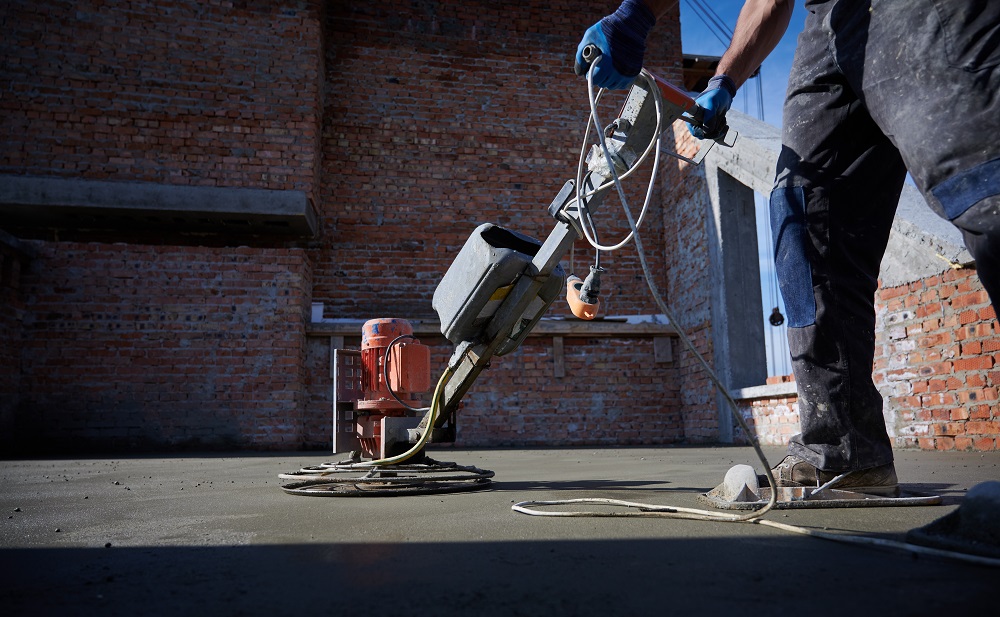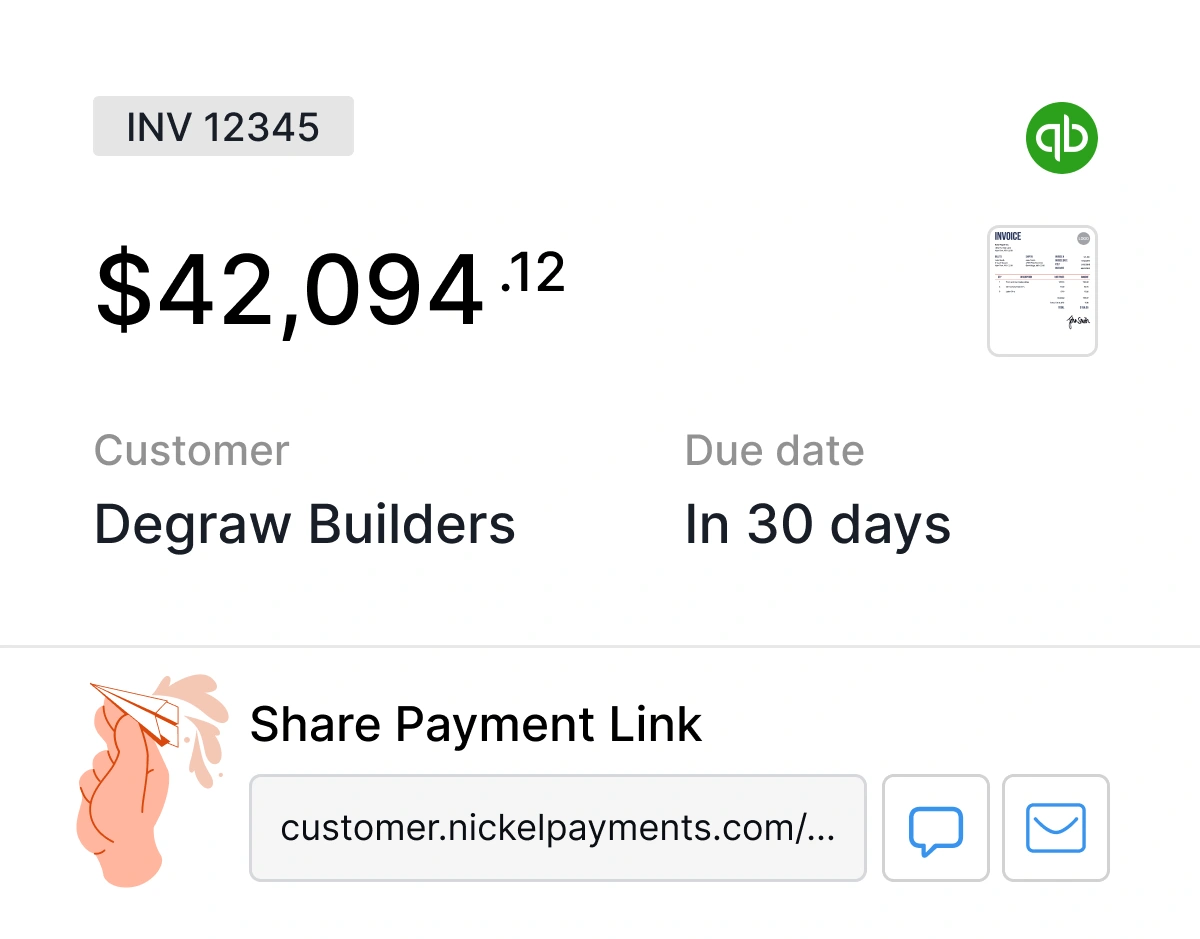The Payment Platform Built for Concrete Contractors
Build solid cash flow with payments that actually work for concrete professionals

Trusted by 10,000+ industrial small businesses














































Why Concrete Contractors Are Switching to Nickel
Unlike traditional payment processors that treat you like a "high-risk" business, Nickel was built specifically for trade professionals who handle large invoice-based transactions. We understand that:
- $30,000 commercial concrete pours are normal business, not suspicious activity
- Seasonal construction projects create payment surges that banks often flag as unusual
- You need reliable processing during peak construction seasons like spring and summer
- Your cash flow depends on predictable payment timing, not arbitrary holds
Result: No surprise account holds, no "business verification" delays, no risk department calls.

Why Concrete Contractors Are Switching to Nickel
Unlike traditional payment processors that treat you like a "high-risk" business, Nickel was built specifically for trade professionals who handle large invoice-based transactions. We understand that:
- $30,000 commercial concrete pours are normal business, not suspicious activity
- Seasonal construction projects create payment surges that banks often flag as unusual
- You need reliable processing during peak construction seasons like spring and summer
- Your cash flow depends on predictable payment timing, not arbitrary holds
Result: No surprise account holds, no "business verification" delays, no risk department calls.
Before Nickel vs. After Nickel
Multiple systems for invoicing, payments, and bookkeeping
Banks freeze accounts over routine $25,000 concrete pours
Lose 1-3% on every transaction ($250-750 per typical job)
Banks don't understand concrete business patterns
Hours spent matching payments to invoices in QuickBooks
Everything integrated: invoicing, payments, and QuickBooks sync
We understand large and variable transactions are normal for concrete contractors and our support team is highly responsive if you ever run into issues
Keep 100% of what customers pay you
Designed around how your business actually works
Your invoices and payments automatically sync to the right customer, service call, and project, plus seamless AP integration
The Concrete Industry Payment Challenge
The concrete industry faces unique financial pressures that generic payment processors simply don't understand. With concrete production and delivery representing a $68 billion revenue industry in the United States and the global ready-mix concrete market reaching $998.69 billion in 2024, concrete contractors are operating in a massive but fragmented market where cash flow management can make or break a business.
Project Payment Complexity:
Concrete work often involves multiple stages of payment tied to project milestones. A commercial foundation pour might require material deposits, progress payments during construction, and final payment upon completion. When property developers or general contractors delay payments - as 82% of construction contractors now face payment waits of over 30 days - concrete contractors are left carrying the financial burden for expensive materials and equipment rentals.
Material Cost Volatility:
Concrete materials like cement, aggregates, and admixtures represent significant upfront costs that contractors must often finance before receiving payment. With concrete selling prices growing from $113.08 per cubic yard in 2016 to $179.89 in 2024, a 6% annual growth rate, contractors face increasing pressure to maintain positive cash flow while material costs continue rising.
Seasonal Cash Flow Swings:
The concrete industry experiences significant seasonal variations, with peak activity during warmer months when weather conditions are ideal for pouring and curing. During these busy periods, contractors might handle multiple large projects simultaneously, creating cash flow challenges when customers pay slowly but suppliers and subcontractors expect prompt payment.
Equipment and Labor Financing:
Concrete work requires substantial investments in specialized equipment like concrete pumps, mixers, and finishing tools. Labor costs also spike during peak seasons when skilled concrete workers command premium wages. When customer payments are delayed, meeting equipment payments and payroll becomes a constant stress point.

The Concrete Industry Payment Challenge
The concrete industry faces unique financial pressures that generic payment processors simply don't understand. With concrete production and delivery representing a $68 billion revenue industry in the United States and the global ready-mix concrete market reaching $998.69 billion in 2024, concrete contractors are operating in a massive but fragmented market where cash flow management can make or break a business.
Project Payment Complexity:
Concrete work often involves multiple stages of payment tied to project milestones. A commercial foundation pour might require material deposits, progress payments during construction, and final payment upon completion. When property developers or general contractors delay payments - as 82% of construction contractors now face payment waits of over 30 days - concrete contractors are left carrying the financial burden for expensive materials and equipment rentals.
Material Cost Volatility:
Concrete materials like cement, aggregates, and admixtures represent significant upfront costs that contractors must often finance before receiving payment. With concrete selling prices growing from $113.08 per cubic yard in 2016 to $179.89 in 2024, a 6% annual growth rate, contractors face increasing pressure to maintain positive cash flow while material costs continue rising.
Seasonal Cash Flow Swings:
The concrete industry experiences significant seasonal variations, with peak activity during warmer months when weather conditions are ideal for pouring and curing. During these busy periods, contractors might handle multiple large projects simultaneously, creating cash flow challenges when customers pay slowly but suppliers and subcontractors expect prompt payment.
Equipment and Labor Financing:
Concrete work requires substantial investments in specialized equipment like concrete pumps, mixers, and finishing tools. Labor costs also spike during peak seasons when skilled concrete workers command premium wages. When customer payments are delayed, meeting equipment payments and payroll becomes a constant stress point.
Simplified Modern Workflow
Send invoice (or use your existing invoicing)
Customer pays instantly via secure link
Payment auto-syncs to QuickBooks
Money hits your account in 2 business days
Built-in QuickBooks Integration
Your payments automatically sync to the right invoice, customer, and job. No more:


Compare: Nickel vs. Other Payment Platforms
What This Means for Your Concrete Business
Save Money
Zero ACH fees: Save $5,000-12,000 per year on a typical concrete business No hidden costs: No setup fees, monthly fees, or surprise charges Early payment discounts: Pay and get paid faster, capture supplier discounts
Save Time
Automated reconciliation: 3+ hours per week saved on bookkeeping Instant invoicing: Send payment links directly from job sites One system: Stop switching between payment apps, banking apps, and QuickBooks
Reduce Risk
Process large payments worry-free: We understand concrete transactions and provide responsive support when needed Predictable processing: Money hits your account in 2 business days Secure payments: Bank-level security without the bank headaches
Concrete Industry Payment Breakdown
The U.S. concrete industry represents a massive but highly fragmented market that traditional payment processors weren't designed to serve effectively.
Market Fragmentation:
The concrete industry includes thousands of small-to-medium contractors competing alongside major national players. Most concrete contractors operate with fewer than 20 employees but handle projects worth tens of thousands of dollars. This creates a unique challenge where small businesses need to process large transactions efficiently while managing tight margins.
Project-Based Cash Flow:
Unlike retail businesses with steady daily sales, concrete contractors experience lumpy cash flow tied to project completion. A residential contractor might complete three $15,000 driveways in a week, followed by a $50,000 commercial foundation the next week. According to industry data, concrete production volumes reached 379 million cubic yards in 2024, but remained 18% below the 2005 peak, indicating the cyclical and project-dependent nature of the business.
Payment Term Pressures:
The construction industry's "pay-when-paid" structure creates a cascade effect where concrete contractors often wait for general contractors to be paid by property owners before receiving their own payment. This system forces concrete contractors to essentially finance their customers' projects, tying up working capital for 60-90 days or more.
Technology Integration Gaps:
Many concrete contractors still rely on basic accounting software and manual payment processes. The government's fiscal treasury ACH network processes billions in B2B transactions annually, but many concrete contractors haven't fully leveraged these digital payment capabilities due to complex fee structures and poor integration with existing business systems.

Concrete Industry Payment Breakdown
The U.S. concrete industry represents a massive but highly fragmented market that traditional payment processors weren't designed to serve effectively.
Market Fragmentation:
The concrete industry includes thousands of small-to-medium contractors competing alongside major national players. Most concrete contractors operate with fewer than 20 employees but handle projects worth tens of thousands of dollars. This creates a unique challenge where small businesses need to process large transactions efficiently while managing tight margins.
Project-Based Cash Flow:
Unlike retail businesses with steady daily sales, concrete contractors experience lumpy cash flow tied to project completion. A residential contractor might complete three $15,000 driveways in a week, followed by a $50,000 commercial foundation the next week. According to industry data, concrete production volumes reached 379 million cubic yards in 2024, but remained 18% below the 2005 peak, indicating the cyclical and project-dependent nature of the business.
Payment Term Pressures:
The construction industry's "pay-when-paid" structure creates a cascade effect where concrete contractors often wait for general contractors to be paid by property owners before receiving their own payment. This system forces concrete contractors to essentially finance their customers' projects, tying up working capital for 60-90 days or more.
Technology Integration Gaps:
Many concrete contractors still rely on basic accounting software and manual payment processes. The government's fiscal treasury ACH network processes billions in B2B transactions annually, but many concrete contractors haven't fully leveraged these digital payment capabilities due to complex fee structures and poor integration with existing business systems.
Ranked #1 Easiest to Use Payment Solution by G2
See why Nickel outranks every major competitor, including Forwardly, Melio, and Square
Get Started in Minutes
No contracts. No setup fees. No risk.
Sign Up (2 minutes)
Connect QuickBooks (1 click)
Start Getting Paid (immediately)

Ready to Fix Your Payment Problems?
Stop losing money to fees and time to complicated workflows. Join thousands of contractors who've already made the switch.








